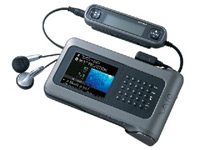Sony’s Connect service is the one that gets most comparisons with iTunes – it requires a special application, Sonic Stage, has its own DRM and even uses its own hardware. We thought we’d have a look to see how it measures up.
Registration is completely different from the American version – you register on a webpage, rather than in the application, and Sony demand that you supply your gender and mobile number. I can’t invent a gender, but I certainly gave a false mobile number – I don’t really need those “helpful” texts telling me about new offers. You have to agree to them using your personal details or you can’t register. Not cool, Sony – very poor. When you register a credit card, you also have to agree to them using this personal data too – so that they can match up the tunes you’ve bought with your address and sell that information on.
A nice touch is being able to set what genre page you’re presented with when you start the application up. I wish iTunes would use this feature as it would save me having to look at Nelly Furtado’s moon-faced stare every time fire up their store.
Downloading Connect is as simple as you’d expect, though you don’t download the entire application. You begin the process by downloading a 600k installer which then pulls the Sonic Stage application down – and that’s another 20 megabytes. Servers are currently speedy bandwidth-wise and the whole process only took a few minutes.
If you have the US version of Sony Connect installed, you MUST remove it first, though Sony don’t bother telling you that. Shoddy coding and teams that don’t talk to each other mean that the European version will install OK, but when you launch their service you’ll be taken to the US store – and it won’t let you in. There is no option to fix this, and you’ll have to uninstall everything start again from the very beginning. As I did.
Once installation is complete, Sonic Stage springs an unwelcome last minute restart on you. When you’ve rebooted and started up again, you’re then left with an orange Connect icon on your desktop – make sure your internet connection is on and away you go. After setting a couple of preferences, you’re straight into the store.
The store itself looks remarkably like iTunes – I suppose there’s not too many ways for laying these things out, and it’s a good adaptation. The store even has forward and back buttons for navigation, and it’s quite easy to find your way around. News items are displayed on the pages, giving it a magazine-type feel, another feature that makes the store more useful.
Searching for tracks is easy from the side bar, and songs from the same album are easily identified as they appear with the same tiny album cover thumbnail in the search results. My search for Eno listed a few of his tracks, but lots of irrelevant stuff – and iTunes’ panel with quick links to artist pages is sorely missed in this respect.
But what’s this? Variable pricing! Some tracks are a reasonable 79p, some more popular ones are £1.19. Yes – the more people want that track, the more expensive it is. This makes popular music more expensive than on iTunes – even for the same tracks. For example, squawky pop whiner Dido’s ‘White Flag’ is £1.19 on Connect, but 79p on iTunes. Connect is around 50% more expensive.
The same goes for albums – Wagon Christ’s classic Tally Ho! is £7.99 on iTunes, and £9.99 on Connect – about 25% more expensive.
Previewing tracks is simple – but there’s no way of knowing how far through a preview you are – there’s no progress bar.
Buying tunes involves clicking on the cart icon and confirming with your password – then the Sonic Stage Downloader takes over from there. The process is very quick and keeps you well informed with a bar. I chose Photek’s “Rings Around Saturn” as my test tune, and the process was effortless.
Once downloaded you can play the track immediately, or transfer it to your Sony music hardware with a click. The Sonic Stage music library functions are comprehensive, and can sort music in any of the usual ways, including the last time played tracks.
You can transfer some music to a recordable CDs, but forget trying to transfer anything you’ve bought from Connect. You’re simply not allowed, which is in sharp contrast to iTunes, where you can make multiple copies of the same playlist.
In summary – will appeal to Sony purists who bought a Sony music player instead of an iPod, but has an almost insultingly restrictive DRM model.
Pros – stylish, easy to use, decent library of music, works with your Sony gear
Cons – inexplicably more expensive than iTunes for the same product, very restrictive rights, fiddly install, won’t work with many devices, Sony have no regard for customers’ privacy
 Dell have come up with a slightly controversial deal to attract customers who are disgruntled with the iPod’s less than impressive battery life: tempt them to buy a Dell DJ as a replacement by offering them US$100 (€82) for their dud iPod. With the rebate, this makes the 15gb music player half-price.
Dell have come up with a slightly controversial deal to attract customers who are disgruntled with the iPod’s less than impressive battery life: tempt them to buy a Dell DJ as a replacement by offering them US$100 (€82) for their dud iPod. With the rebate, this makes the 15gb music player half-price.